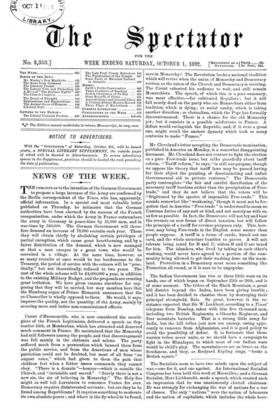Mr. Cleveland's letter accepting the Democratic nomination, published in America
on Monday, is a somewhat disappointing document. Mr. Cleveland does not venture to fight the election on a pure Free-trade issue, but talks guardedly about tariff reform. " Tariff reform," he says, " is still our purpose, though we oppose the theory that tariff laws may be passed having for their object the granting of discriminating and unfair Governmental aid to private ventures." The Democratic party contemplate "the fair and careful distribution of the necessary tariff burdens rather than the precipitation of Free- trade," and they do not believe that the voters will be "frightened by the spectre of impossible Free-trade." This sounds somewhat like " weakening," though it must not be for- gotten that in America " Free-trade " is understood to mean no Customs duties of any sort or kind, and not merely as with us, as few as possible. In fact, the Democrats will not try and base the revenue on new forms of direct taxation, but will follow the principle of a tariff for revenue purposes only. This, how- ever, may bring Free-trade in the English sense sooner than people suppose. A tariff is a house of cards ; knock out one card, and the whole structure tumbles to pieces. A will not tolerate being taxed for B and C, unless B and C are taxed for him. The islanders, who lived by taking in each other's washing, would never have agreed to a portion of the com- munity being allowed to get their washing done on the main- land. Protection in a Democracy must mean something like Protection all round, or it is sure to be unpopular.


































